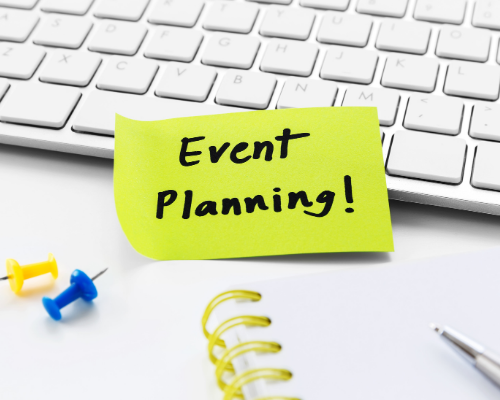The success of any event is self defined — so how do you decide those criteria? Let us guide you.
Events can be a crucial part of your marketing and your money making strategy as a Speaker Author and Coach. If you decided to make events part of your business model (if you are not sure, we suggest you first go read our thoughts on that here: https://speakerinsight.medium.com/why-you-should-run-events-fe516e4d56da

First things first. What do we mean by events?
We’ve said this before; when we say ‘events’ we mean anything that allows people to experience you in a group setting of some kind. It likely goes wider than you might consider, so here’s a non-exhaustive list to get you thinking about what you currently attend or provide:
- Workshops
- Taster sessions
- Seminars and Conferences
- Trade Shows
- Retreats
- Client Appreciation Events
- Team-Building Events
- Product Launch Events
- Awards
- FB or LinkedIn Live events
Whichever type of event you are creating, to make it successful you need to define that success upfront. Working out how you’ll be evaluating your event actually makes it possible to plan for the success you desire, and that will make organising, running, and following up the event so much easier.
There are 3 key stages of an event:
- BEFORE — what we call the PLANNING stage:
Deciding the theme and providers, developing content, promoting the event, organising, and co-ordinating people and materials.

- DURING — what we call the SYSTEMS stage:
Providing service: making it easy for people, keeping to time, managing the team
- AFTER — what we call the FOLLOW UP stage:
Delivering the thank you notes, getting testimonials, processing sales, post event marketing and press opportunities
Each of these stages can provide some of the success criteria for your event. We do a whole worksheet on how to prepare and plan for an event and you can grab that here: https://www.speakerinsight.com/eventmanagement. Out of these come the success criteria through which you can evaluate your event.
3 key evaluation criteria to help you run a successful event
First evaluation consideration: Financial Impact
It may sound obvious, but it still needs to be said — every event must add in some way to your business. We suggest you don’t run an event unless it will be financially viable.

Now, that could mean break even because it’s a marketing exercise. Or it might be a low margin product because it builds your credibility or provides you with a regular platform that you ‘own’ which brings its own benefits. Or your event can be a fully funding part of the business — a lucrative product in its own right. ALWAYS set a budget — and ensure you know what kinds of things are going to be needed
Second Evaluation Consideration: The time it takes to Organise, Promote and Market
A successful event relies on great planning and having enough:
- TIME
- TIME!
- TIME!!!
Time is THE make or break of an event’s success — and we find that most people do not leave themselves enough time — to secure your venue, to create the marketing ‘hype’, to develop the content and running order — and a dozen other things!
Remember the maxim that “everything takes longer than you think”. 3–6 months is ideal, pending the size of the event. (Yes, we really do mean that — unless you like being very stressed and running around like a headless chicken!)
Here are just some of the considerations to think about — all these impact on the time you need (and the less time you have for these, the less successful your event will be):
- Where are the audience coming from?
- Are they already known to you?
- Are you attracting new leads?
- Are you using affiliates?
- Creating expectations
- setting the scene
- getting people excited
- building and using a marketing strategy
- creating a ‘story’
- drumming up interest and word of mouth support
- Deciding social media channels to use and how and what for
- Creating ‘platform’ events such as FB events in addition to your main ticket provider e.g. Eventbrite or Tickettailor etc
- Attracting Media attention — interviews, editorials / blogs / articles / memes etc.
You get the idea! The more time you have to plan, organise and galvanise your team and audience, the more likely you’ll be successful. A more detailed version can be found in the worksheet(link again)
Third Evaluation Criteria: Delivering and managing your event

- Finding the RIGHT venue — for the type of event, for transport, for your avatar (what standards do they expect?)
- Creating your running order and ensuring it will work
- Thinking through all the details (we have great checklist for every event
- Thinking through your full team — who will be needed — speakers, supporters, volunteers, sponsors etc.
- What Branding /showcasing
- Get all documentation done early (less cost and less stress!)
- Putting in all the technical support structures (including taking money etc)
- Access to parking / food / information!
Following up is an overlooked part of a successful event. A good percentage of sales are made POST event in addition to at the event — don’t underestimate it, and allow time / resources for it. Prepare for it — have the emails ready, have the scripts in place etc. These will allow you to focus on delivering amazing, authentic value. And THAT is the real key to a successful event — the one that everyone tells everyone else about so appetite is built and the reputation continues beyond the event.
All this to say — events are amazing additions to your business — but make sure you do a lot of up front planning and leave yourself enough time to sort out all the details. That way, you are bound to step back with pride, knowing you’ve had a successful event.Speaker INsight
We support speakers, authors & coaches to monetise their message, market their purpose and create & manage their portfolio business, ON THEIR TERMS™.
